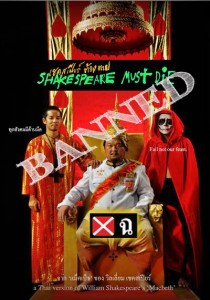Shakespeare Must Die: Thai Authorities Ban Film Adaptation of Macbeth
by Mariana Centeno / April 18, 2012 / No comments
 Samanrat Kanjanavanit, better known as Ing K, is the director of Shakespeare Must Die, the first Shakespearian Thai film, which is based on Macbeth. Although unorthodox, both Ing K and the film’s producer Manit Sriwanichpoom have called Shakespeare Must Die a horror film. What has been more puzzling, however, is the Thai government’s rapid change from a supporter of the film to a condemner.
Samanrat Kanjanavanit, better known as Ing K, is the director of Shakespeare Must Die, the first Shakespearian Thai film, which is based on Macbeth. Although unorthodox, both Ing K and the film’s producer Manit Sriwanichpoom have called Shakespeare Must Die a horror film. What has been more puzzling, however, is the Thai government’s rapid change from a supporter of the film to a condemner.
During the pre-production of Shakespeare Must Die the Thai Film Censorship Board—which is under the supervision of the Department of Cultural Promotion, a branch of Thailand’s Ministry of Culture—supported the project after reading a synopsis and an outline of the movie. The film also received financial support from government initiatives such as the Thai Kem Khaeng Initiative and the Office of Contemporary Art. Nevertheless, on the afternoon of April 3, the Thai Film Censorship Board banned the completed film. Sriwanichpoom explained their decision:“The Board deems that Shakespeare Must Die has content that causes divisiveness among the people of the nation.”
This contradiction has lead to much speculation on why the movie was banned.
Shakespeare Must Die follows the movements of a theatre group staging a production of Macbeth with some important—and controversial—additions. Ing K included real footage taken from Thailand’s May 19, 2010 military crackdown on anti-government protests in which 12 were reported dead and 60 wounded. Scenes from this conflict have been objected by the film board, who expressed fear about the public’s difficulty distinguishing reality from fiction.
According to the Guardian one of the film’s main characters is a dictator named Dear Leader, who bears a resemblance to former Thai Prime Minister Thaksin Shinawatra, who was ousted in a 2006 coup which sparked years of political turmoil between his supporters and critics. The censors also questioned the excessive use of the color red—the film’s murderer is shrouded in a red cloak—which the censors claimed is symbolic of the Red Shirts, a pro-democracy group that has expressed discontentment with the 2006 coup that ousted Shinawatra and were directly involved with the anti-government protests of 2010.
On the film’s web page Ing K declared: “A low budget director must seize every opportunity to add production values. There was no way I could’ve afforded such epic images on my own steam. It was cool and it was free! The lord had provided and I could not refuse.”
Ing K also talked about the “excessive” use of red in the film: “Even without [our] specific cultural heritage, red is the universal color of violence. It takes years to get a film made. Why should Thaksin [Shinawatra] have a monopoly on the color red as well as on everything else?”
Power and greed are very sensitive topics to use in a movie in Thailand since such topics could be seen as a reference to the 2006 coup that overthrew the government of the Prime Minister Thaksin Shinawatra. Everything related to the monarchy is a very delicate matter in Thailand. King Bhumidol Adulyadej is considered an almost divine figure, and publicly criticizing the monarchy could result in a charge of lese-majesty (15 years of prison).
The Thai Film Censorship Board decided to ban the movie unless the director agreed to edit and cut some of the scenes. Ing K refused to cut those scenes, and she said she plans to appeal against the ban.
Besides her work as a controversial filmmaker Ing K is also known for being a journalist, painter, writer and an activist. Years ago she directed a movie called Khon Graab Maa, that was banned as well, and was described as an insult to all religions in Thailand. It has been disappeared from history.




